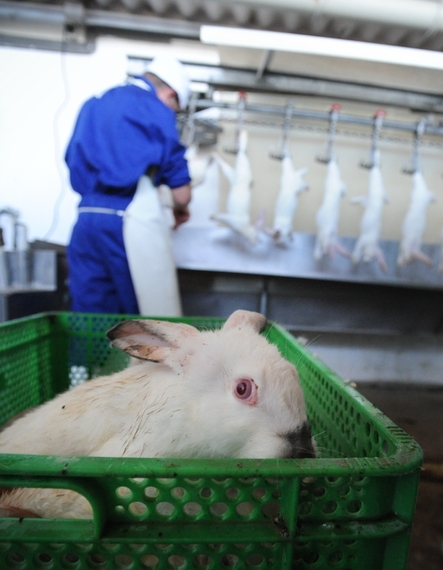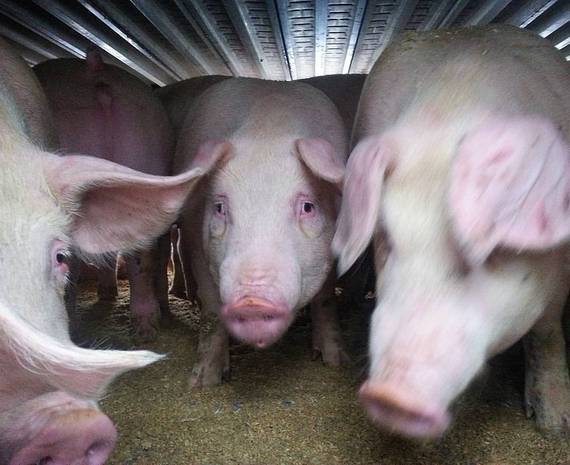
Increasingly, ethical questions of how we use and abuse animals are gripping us. We want to eat, wear, be entertained by, and experiment on animals, but as a naturally empathetic species, we struggle with the suffering they endure in non-consenting service to us.
Although as a society we are currently in support of eating animals, only 0.4 percent of us are not concerned with farmed animal welfare. Just zero point four percent of us don't care. These data reflect a common sentiment that it's okay to eat animals, but only if they were treated well in life and in death.
Alex--a pseudonym to protect his identity--is an investigator who has gone undercover as an employee at North American farms and slaughterhouses to document and expose conditions. He has spent years witnessing and bringing the suffering of farmed animals to light. Alex dismisses as fiction the notion that animals are or even can be treated well:
What the modern farming industry considers 'treating an animal well' actually just means treating an animal less badly. Animals are packed into ammonia-filled windowless sheds. Even at the very best farms, animals endure psychological, emotional and physical suffering. They're mutilated without painkillers. Their family groups are broken up when animals are sold or slaughtered.
It shouldn't surprise us that animal suffering is the norm; the goals of animal welfare and profit are mostly inversely related. And this is, after all, an industry that resists even modest welfare reforms.
Meat, dairy and eggs with humane certifications are becoming increasingly popular as consumers attempt to live in accordance with the notion that we can eat animals as long as they were treated well. And yet, these certifications do not mean what many think they do.
A false advertising complaint from Animal Justice recently took on "certified humane" chicken meat. The legal complaint points out that after a miserable life, animals endure a frightening, painful death--that "humane" is such an inaccurate description, it amounts to unlawful marketing. Sure enough, when consumers were asked to describe what they thought "certified humane" meant, they painted a dramatically different picture from the reality.
But what if animals really were treated well? Is it okay to kill them for food that we don't need to be healthy and happy?
Jo-Anne McArthur is a photojournalist who has been documenting animals in the human environment globally for over a decade. She's witnessed a wide variety of species being slaughtered in North America, Europe, Asia, and Africa.

Photo: Jo-Anne McArthur / We Animals
While conceding that humane lives are theoretically possible, she insists humane deaths are not. The animals can see what's happening, and they can smell it too--the shed blood and decomposing body parts of their own. She says animals' sense of smell is strong, and they rely on it to understand the world. Jo-Anne says that facing death:
They see. They smell. They fight. They bellow. Or they freeze in fear. They look for a way out. They huddle with their kin. They fight until the last moment. They fight after their throats are slit.
Jo-Anne also points out that farming animals is a major contributor to environmental degradation and climate change. Even putting animal rights aside, "we have to look beyond our noses," she says, "to a broader world view. At this point in history, this is a necessary step in the preservation of life on earth."
Tayler Staneff, a Ph.D. candidate in the political sociology of the animal rights movement, protests outside slaughterhouses, bearing witness to doomed animals in their last moments of life. She echoes Jo-Anne's sentiment that imminent death is a sensory assault--that animals can see, hear and smell it coming.

Photo: Tayler Staneff. Pigs in a slaughter truck in their last moments of life. "Some photos will haunt me forever. This photo is one of them," she says.
Tayler was also present when a deer, shot and wounded through the stomach by hunters, came racing into her backyard leaving a trail of blood. The frightened animal was running for her life. She hid in the long grass, bleeding out, until she was euthanized by a conservation officer. Scarred by this experience, Tayler puts it simply: "You cannot humanely kill someone."
It's not only the animals who are victimized in slaughterhouses. Philosophers have long contemplated the emotional toll accruing to those who kill animals for a living. Thomas More said, "slaughtering our fellow creatures gradually destroys the sense of compassion." This insight in born out in research showing when slaughterhouses are built, a town's violent crime rates increase.
In a mini-doc on the ethics of slaughter, The Slaughterhouse, Jo-Anne highlights the human as well as the non-human animal casualties of the business of slaughter. The Tanzanian slaughter workers she filmed questioned whether we should be killing animals at all. They said nobody wants to do the work of killing animals, and slaughterhouse workers are considered the lowest in society.
The Slaughterhouse from Kelly Guerin on Vimeo.
Closer to home, too, slaughterhouses are largely staffed with refugees and migrants, and characterized by exploitative labour conditions. Slaughtering animals for food takes place in a dirty underbelly of society that very few of us are completely comfortable with.
As Jo-Anne states in The Slaughterhouse, slaughter "is the story no-one wants to know." And so the question becomes, "How do we get us all to look, to really see, and to not turn away?"
It's no minor question. So many of us stash our discomfort with what's happening to animals in the theoretical possibility of humane meat. If we are ever to relieve the animals' immense suffering, we need to "really see," so that we can meaningfully act.
